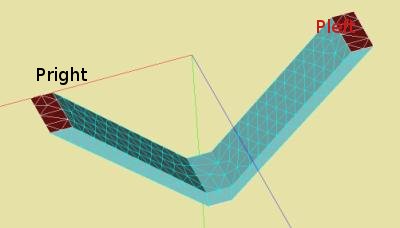Difference between revisions of "Contrib:KeesWouters/plasticity"
Keeswouters (Talk | contribs) (→'''General procedure of the calculation''') |
Keeswouters (Talk | contribs) (→'''General procedure of the calculation''') |
||
| Line 17: | Line 17: | ||
* define the boundary conditions | * define the boundary conditions | ||
* define the maximum load, in this case a maximum displacement at the plane Pforce | * define the maximum load, in this case a maximum displacement at the plane Pforce | ||
| − | * define 'time' and 'load' increments: | + | * define 'time' and 'load' increments: |
: the time is defined from 0.0 to 2.1 and stepsize 0.1 s, yielding 21 points.<br/> | : the time is defined from 0.0 to 2.1 and stepsize 0.1 s, yielding 21 points.<br/> | ||
| − | : The load multiplication factor is defined by ramping from 0.0 to 1.0 during the first 1 s<br/> | + | : The load multiplication factor is defined by ramping from 0.0 to 1.0 during the first 1 s,<br/> |
| − | : then keep it constant for 0.1 s and<br/> | + | : then keep it constant at 1.0 for 0.1 s and<br/> |
| − | : decreasing from 1 to 0 in the last second. | + | : decreasing from 1.0 to 0.0 in the last second. |
* perform the analysis | * perform the analysis | ||
* define results in a med-file for Salome, in this case, displacements, vonMises and plastic stresses | * define results in a med-file for Salome, in this case, displacements, vonMises and plastic stresses | ||
Revision as of 14:15, 12 August 2009
V shaped construction under plastic deformation
The V shaped is defined by an extrusion of a V shaped face.
Three planes are defined in the geometry: Pleft and Pright for applyind boundary conditions (dx=dy=dz=0) and Pforce for defining a prescribed displacement in y direction.
The definition of the geometry as well as the meshing is given in the Python input file.
In the geometry module of Salome select File --> Load Script (or ctrl T) and thereafter the file: Media:kw_gm_vshape.zip.
General procedure of the calculation
The general procedure of the calculation is as follows:
- read the mesh
- apply the non linear material properties of the construction
- define the boundary conditions
- define the maximum load, in this case a maximum displacement at the plane Pforce
- define 'time' and 'load' increments:
- the time is defined from 0.0 to 2.1 and stepsize 0.1 s, yielding 21 points.
- The load multiplication factor is defined by ramping from 0.0 to 1.0 during the first 1 s,
- then keep it constant at 1.0 for 0.1 s and
- decreasing from 1.0 to 0.0 in the last second.
- perform the analysis
- define results in a med-file for Salome, in this case, displacements, vonMises and plastic stresses
- print results in a file, notably the displacements of the plane Pforce and its corresponding forces.
In the figure the results of four load cycles are given: the maximum displacement of each calculation is 0.080, 0.085, 0.095 and 0.100 mm. The plastic deformation at a load free construction after the load cycle is roughly 0.005, 0.009, 0.018 and 0.022 mm.
Each dot in the curves indicate a output point of the calculation. In most case 21 points are given, these have been defined in the 'time' increment function.
tbc


